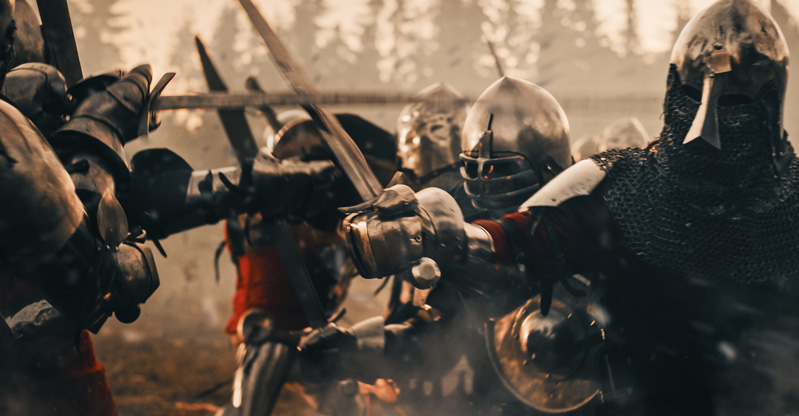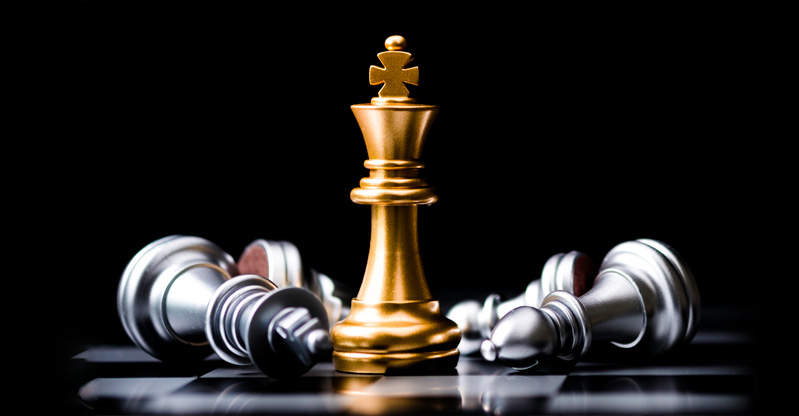Chess. The classic game of strategy and tactics. Of knights leaping over pieces to score captures. Of bishops sliding diagonally to seize the enemy. Of Queens putting Kings into checkmate from across the board. And of lowly pawns managing to cross the entire length of the metaphorical battlefield to earn a field promotion.
There’s no game quite like chess. It has seized the imaginations of kings and commoners alike for thousands of years. Its inherent ability to teach battleground tactics has led it to be a mainstay of generals and dusty professors in gentlemen’s clubs. Not that the game is unsuited for both genders. Its bias towards men’s interests is passing. As of 2022, there are 39 females with the title Grandmaster. And no wonder. Women have as much to learn from chess as males do. Because it isn’t a game simply for preparing young officers for war, that may have been its origin, millennia ago, in the unknown lands of time it sprouted from. But now, it serves a great purpose for general education, not just for generals.
It most certainly plays a role in how well you can do in the business world. And it plays this role in any education, really. In fact, it’s essential.

The Great Game that improves your child’s brain
A great many studies have found that chess is excellent for your brain. They show how chess improves creativity, memory, reading skills, planning and foresight, and problem-solving. Not too difficult to imagine if you consider what the game involves.
Creativity comes in the way you play. You’re constantly facing off against different opponents with different approaches in their tactics. To win, you need to develop new methods against various stratagems. Your brain is constantly looking for a new angle, a new way to deploy your pieces on the board to catch your opponent by surprise and start capturing their pieces.
Memory is improved by recognizing set strategies utilized by some opponents, in the oft-times complex openings, and constantly reminding oneself of the new, treacherous layout of the board during each turn. A layout with pitfalls could see your army start being picked off one by one.
Reading skills come in because of the intense concentration involved in a game of chess. A player needs to constantly focus because of the complexity of a board with 32 pieces, many with unique properties, among 64 squares. This improves certain skills, including — in children — reading, because reading a book and getting “hooked” into it requires a certain amount of concentration. This also leads to a better comprehension of the subject matter.
Planning and foresight are plain to see. It is a game of strategy, after all, one that involves no dice roll chance but rather player skill, turn after turn. And it is said if you can count five moves ahead, you have it in you to become a grandmaster of the game. Planning means developing a complex strategy to trap your opponent and start taking their pieces — thereby weakening and eventually defeating them. Foresight requires you to anticipate your opponent’s plans: the traps they’re laying out for you, such as presenting an easy kill, only for it to be a sacrificial lamb aimed at getting your more highly valued chessman. A queen who takes a knight (as represented in an equine shape) only to be taken by a rook is a severe blow for a player. But it teaches a valuable lesson: always look a gift horse in the mouth… especially if it’s a Trojan Horse from the enemy!

“Sally forth to victory, men!” We thought we’d throw in at least one big epic battle for you, considering that the topic allows it.
Problem-solving in the din of a battle joined
As for problem-solving, well, that comes naturally in a board game that’s essentially a representative of an epic battlefield, with charging horses, footmen rapidly approaching, clerics wielding maces, and siege weapons flinging fiery hell upon the enemy. And with an elite force prying open gaps in the defenses, all the while, the general himself is kept as safe as can be: boxed in by his bodyguards.
There is a clash as men meet in the center of the battleground. The ring of steel echoes out to the crows waiting above. The field lights up with fire as arrows rain down, and pikes are brought to bear, attempting to hold off armored knights on war steeds. Those sworn to the cloth never carry blades make merry use of their flails… flinging, spinning death upon those who oppose them. And the heavy elites start their bid to go strategically, as directed, into the fray — causing chaos as they take out key commanders.
The casualties mount up as the day goes on, men lie defeated, knights are vanquished, and clerics have been sent to their makers. We are in the endgame now, and whoever has the advantage in numbers will likely win the day. But for the general on the defensive, his desperate need to stave off defeat results in the use of creative problem-solving to at least draw on a stalemate. In war, just as in business, you sometimes must problem-solve very quickly to avoid facing the ax.

“Queen to Rook’s 5”. Business planning and strategy is a lot like chess.
The Chess Board and the Boardroom
This is chess. In all its glory. It transcends its plastic pieces and its wooden cardboard. It teaches your child how to fight mental battles and win them. And the world is filled with mental battles of all sorts. From playground politics to ploys in your own office environment. It’s just the nature of the game of life. Knowing how to think strategically and tactically is essential to staying a couple of moves ahead. This is especially true in the boardroom. You’re required to put on your officer’s cap and tactically think when dealing with business. How are you going to improve sales? How are you going to attract new customers? How will you outcompete competitors every bit as eager as you to take a large slice of the consumer pie?
That is the battlefield of business. To succeed in it, you must do the same thing as you do in chess. Consider your opening moves, adjust and plan your main operations, and carefully close the endgame in victory. An endgame, for instance, is making that sign-on with a massive client, causing your business to boom. A coup you prevented your rivals from succeeding in because you were thinking five moves ahead.

Your child, the master tactician. The future great general of the business battlefield.
Aside from the numerous benefits listed about why chess is good for your child’s cognitive development, the most obvious is the ability to plan and prepare. It will serve them well in the future of work, which is uncertain with numerous disruptors foreseen to occur in the marketplace.
One doesn’t have to be a genius at creating things to succeed. Steve Jobs, foremost, was a visionary. He would have made an excellent chess player. (In fact, he was. He even played a unique, more complex variation of the game called Kriegspiel) He saw gaps in the technology market up for grabs and ways to vastly improve technologies that weren’t widely accepted until then. There were MP3 players in the early 2000s, but hardly anyone used them until the iPod came along.
Cellphones weren’t all that smart until the iPhone was created. It brought with it the frequently used expression, “there’s an app for that” for a massive new market in mobile software, which created a world today full of apps that make our lives so much easier. And the tablet computer was a failure last seen a decade before Jobs unveiled the iPad. Just like that, he made a new product type that many soon produced their versions of, creating a new market.
Then there’s the post-Job world of Apple, where the company continues his spirit of innovation in the silicon chip market. Apple created the M1 chip, built on an entirely new architecture compared to companies like Intel’s chips. Its main claim to fame? How it uses such low wattage for such a high power output. How does that relate to chess? It’s creativity, planning, and foresight, all skills we described earlier as being given a massive boost by learning to play chess.
Foresight means seeing what others don’t, like gaps in the market. Creativity means coming up with business solutions for those gaps. And planning is putting into action what you’ve envisioned. It’s why a company like Apple is worth over $1 trillion today. Now that’s certainly what we’d call dominating the technology battleground. So, the dearly departed Mr. Jobs once proudly, possibly, got to say, “Check, and mate, tech market.”
Will your child be another major disruptor? Another tactical genius? Able to muster his forces and bring back the spoils of war? Well, perhaps. If nothing else, our chess courses will give them the best chance at seizing the initiative in the boardrooms of the future they may find themselves in. And they’ll most certainly be enabled to be the best versions of themselves through the play and practice of this ancient game.
It could even see them crowned king of the company.

Long live the Chief Executive Officer!









Nice post. I learn something totally new and challenging on websites
This is really interesting, You’re a very skilled blogger. I’ve joined your feed and look forward to seeking more of your magnificent post. Also, I’ve shared your site in my social networks!